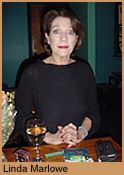|
Diatribe Of Love
Linda Marlowe Hull Truck Theatre Friday 16 November |
The novelist Gabriel Garcia Marquez wrote only one play. Linda Marlowe has chosen this piece of theatre, in which she is the sole performer, as the follow-up to the highly successful 'Berkoff's Women'. The play explores the feelings of a middle-aged woman about her increasing isolation in a loveless marriage. As she prepares for a public celebration of an anniversary of the marriage, she exposes her private anguish. The action spans the time it takes her to prepare herself for the party, but her monologue creates a vivid picture of her life over the years of her marriage and, by the end of the play, a vision of the years to come.
 This translation of 'Diatribe of Love' by Gwynne Edwards is superb, combining contemporary rhythms and phrasing with descriptions which conjure clear images, encouraging the audience to identify precisely with the desolation of Marlowe's character. However desperate and isolated this woman has become, she is never cloying or pathetic. She acknowledges that she stays in the marriage despite accepting its flaws: 'You've managed to make me happy without being happy. Happy without love.' Rapid changes of mood and biting humour in the text allow Marlowe to use the full range of her skills, building a mental picture of the absent husband by recalling the absurdities and shortcomings of his behaviour: 'We never discuss problems from the waist down.' The play gives a raw and honest account of the insecurities of growing older, the efforts made to preserve youth, the creams, potions and 'placenta poultices' used with increasing desperation. 'There comes a moment', says Marlowe's character, 'when a married woman can sleep with another man and not be unfaithful.' The play manages to get under the skin, to unlock common experience without ever being overt or strident. It is a beautifully shaped piece of theatre, exactly the right length to say what it has to say without overplaying the message. There are moments of magic - initially when Marlowe, sitting before an imaginary mirror, removes every remnant of make-up, removing the physical mask before facing her inner demons. And at the end, a long and riveting silence while she again takes her place at the mirror and slowly rebuilds the public persona - powder, rouge, eyeshadow, lipstick - before going out to face the party with dignity and resignation.
This translation of 'Diatribe of Love' by Gwynne Edwards is superb, combining contemporary rhythms and phrasing with descriptions which conjure clear images, encouraging the audience to identify precisely with the desolation of Marlowe's character. However desperate and isolated this woman has become, she is never cloying or pathetic. She acknowledges that she stays in the marriage despite accepting its flaws: 'You've managed to make me happy without being happy. Happy without love.' Rapid changes of mood and biting humour in the text allow Marlowe to use the full range of her skills, building a mental picture of the absent husband by recalling the absurdities and shortcomings of his behaviour: 'We never discuss problems from the waist down.' The play gives a raw and honest account of the insecurities of growing older, the efforts made to preserve youth, the creams, potions and 'placenta poultices' used with increasing desperation. 'There comes a moment', says Marlowe's character, 'when a married woman can sleep with another man and not be unfaithful.' The play manages to get under the skin, to unlock common experience without ever being overt or strident. It is a beautifully shaped piece of theatre, exactly the right length to say what it has to say without overplaying the message. There are moments of magic - initially when Marlowe, sitting before an imaginary mirror, removes every remnant of make-up, removing the physical mask before facing her inner demons. And at the end, a long and riveting silence while she again takes her place at the mirror and slowly rebuilds the public persona - powder, rouge, eyeshadow, lipstick - before going out to face the party with dignity and resignation.
There is obviously a large number of people in Hull who are interested in theatre. They flocked to Hull Truck to hear John Godber and Alan Ayckbourn. Strange, then, that a few more did not turn up to watch this excellent example of theatre in practice.
![]()